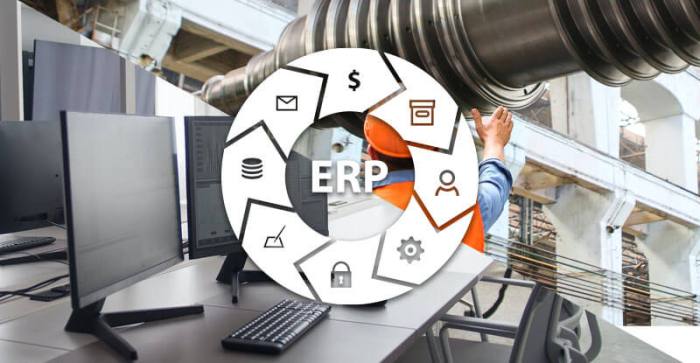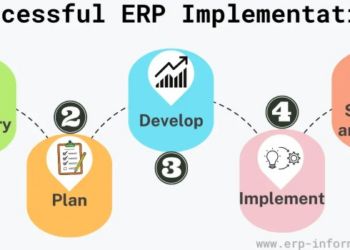Embark on a journey into the world of ERP for manufacturing, where streamlined processes and optimized operations await. Discover how ERP systems revolutionize the manufacturing industry, bringing unparalleled benefits and enhanced productivity to businesses of all sizes.
Overview of ERP for Manufacturing
Enterprise Resource Planning (ERP) systems play a crucial role in the manufacturing industry by integrating various business processes into a single system. This allows manufacturers to streamline operations, improve efficiency, and make data-driven decisions.
Examples of ERP Systems in Manufacturing
- Resource Planning: ERP systems help in planning resources such as materials, equipment, and labor to optimize production schedules.
- Inventory Management: Manufacturers can track inventory levels in real-time, minimize stockouts, and reduce carrying costs with ERP systems.
- Supply Chain Management: ERP facilitates communication with suppliers, monitors deliveries, and ensures timely production to meet customer demands.
Benefits of Implementing ERP in Manufacturing
- Improved Efficiency: ERP systems automate manual processes, reduce errors, and enhance overall operational efficiency.
- Cost Savings: By optimizing resource utilization, inventory management, and production planning, manufacturers can reduce costs and increase profitability.
- Enhanced Decision Making: Real-time data provided by ERP systems enables manufacturers to make informed decisions quickly, leading to better outcomes.
Key Features of ERP for Manufacturing

ERP systems tailored for manufacturing come with essential features that streamline operations and enhance efficiency in production processes. These features are specifically designed to address the unique needs of manufacturing businesses.
Inventory Management in ERP for Manufacturing
Inventory management in ERP systems for manufacturing involves the tracking, control, and optimization of inventory levels to ensure smooth production operations. By centralizing inventory data, manufacturers can accurately monitor stock levels, track raw materials, and manage finished goods efficiently. Real-time updates and automated alerts help prevent stockouts, reduce carrying costs, and improve inventory turnover rates.
Production Planning and Scheduling Integration in ERP Systems
ERP systems integrate production planning and scheduling to optimize production workflows and meet customer demand effectively. Through advanced planning tools, manufacturers can create production schedules, allocate resources, and coordinate activities across different departments. By aligning production plans with demand forecasts and resource availability, ERP systems help minimize lead times, improve on-time delivery, and enhance overall production efficiency.
Implementation of ERP in Manufacturing
Implementing an ERP system in a manufacturing environment involves several key steps to ensure a successful integration of the software. It is crucial for companies to follow best practices and be prepared to face challenges along the way.
Steps in Implementing an ERP System for Manufacturing
- Assessment and Planning: Conduct a thorough assessment of the current processes and systems in place. Create a detailed plan outlining the objectives, timelines, and resources required for the implementation.
- Selection of ERP Software: Choose the right ERP software that aligns with the specific needs and goals of the manufacturing company. Consider factors such as scalability, customization options, and vendor support.
- Data Migration: Transfer existing data from legacy systems to the new ERP software. Ensure data accuracy and integrity throughout the migration process.
- Training and Testing: Provide comprehensive training to employees on how to use the ERP system effectively. Conduct testing to identify and resolve any issues before full implementation.
- Go-Live and Support: Implement the ERP system in stages to minimize disruptions. Provide ongoing support and troubleshooting to address any issues that arise post-implementation.
Best Practices for Successful ERP Implementation in Manufacturing
- Strong Leadership and Commitment: Ensure top management is actively involved and committed to the ERP implementation process.
- Cross-Functional Team Collaboration: Involve employees from different departments to provide diverse perspectives and ensure all needs are considered.
- Clear Communication: Maintain open and transparent communication throughout the implementation to keep all stakeholders informed and engaged.
- Regular Monitoring and Evaluation: Continuously monitor the progress of the ERP implementation and evaluate its impact on operations and performance.
- Adaptability and Flexibility: Be willing to adapt to changing circumstances and make adjustments to the implementation plan as needed.
Challenges and How to Overcome Them
- Resistance to Change: Address resistance by communicating the benefits of the ERP system and involving employees in the decision-making process.
- Data Security Concerns: Implement robust security measures to protect sensitive data and provide training on data privacy best practices.
- Lack of Training: Address the lack of training by providing comprehensive and ongoing training programs for employees at all levels.
- Integration Issues: Work closely with the ERP vendor and internal IT teams to ensure seamless integration with existing systems and processes.
Integration of ERP with IoT in Manufacturing
IoT (Internet of Things) plays a crucial role when integrated with ERP systems in the manufacturing industry. By connecting various devices and sensors to the internet, IoT enables real-time data collection and analysis, which can significantly enhance the functionality of ERP systems.
Enhanced Data Collection and Analysis
IoT devices such as sensors and RFID tags can collect data on various aspects of the manufacturing process, including machine performance, inventory levels, and quality control. This real-time data can then be integrated into the ERP system, providing a comprehensive view of the entire operation.
- With IoT integration, ERP systems can automatically update inventory levels based on real-time data from sensors, ensuring accurate stock management and preventing stockouts or overstock situations.
- IoT devices can monitor machine performance and predict maintenance needs, allowing ERP systems to schedule maintenance activities proactively, minimizing downtime and optimizing production efficiency.
- Quality control processes can be improved with IoT devices that track product parameters and detect defects in real-time, enabling ERP systems to flag and address quality issues promptly.
Improved Efficiency and Decision-Making
Integrating IoT with ERP systems in manufacturing offers several benefits in terms of efficiency and decision-making. By automating data collection and analysis, IoT devices streamline processes and provide valuable insights for better decision-making.
- Real-time data from IoT devices allows ERP systems to optimize production schedules, identify bottlenecks, and improve overall operational efficiency.
- IoT-enabled predictive maintenance can reduce equipment downtime, extend asset lifespan, and ultimately lower maintenance costs for manufacturing facilities.
- By leveraging IoT data for predictive analytics, ERP systems can anticipate demand fluctuations, optimize inventory levels, and enhance supply chain management for improved decision-making.
Closure
In conclusion, ERP for manufacturing stands as a beacon of innovation and efficiency in the modern industrial landscape. Embracing ERP solutions can propel companies towards success, ensuring seamless operations and strategic decision-making for long-term growth.
Questions Often Asked
How can ERP benefit manufacturing companies?
ERP streamlines processes, enhances efficiency, improves decision-making, and boosts overall productivity in manufacturing.
What are the common challenges faced during ERP implementation?
Common challenges include data migration issues, resistance from employees, and the need for extensive training.
How does IoT integration enhance ERP systems in manufacturing?
IoT devices provide real-time data, enable predictive maintenance, and optimize production processes when integrated with ERP systems.










